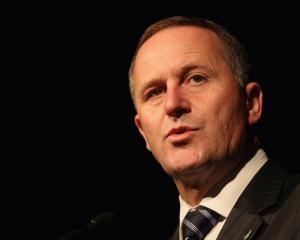The National Party has long experienced tensions within its membership about the welfare state it inherited from Labour and what it should do about it.
Some of its leaders, notably Sir Robert Muldoon, felt obliged to maintain and, in several respects, improve the generosity of the State to beneficiaries; others, such as Donald Brash, adopted hardline policies that deeply offended the more moderate members.
It must be within the political memory of John Key that one of his supporters in Parliament, the former Dunedin list MP Katherine Rich, was sacked by Dr Brash as the party's welfare spokeswoman when she refused to endorse his hardline welfare speech at Orewa in 2005.
Dr Brash, acting with the support - some say the pressure - of right-wing Auckland MPs, replaced her with Judith Collins, not an MP noted for her liberality on welfare issues.
Dr Brash, it will be recalled, said in his speech that women who became pregnant while receiving the domestic purposes benefit should receive extra money only in exceptional circumstances; he also suggested they consider adopting out their children.
Now Mr Key is Prime Minister and has as his social development minister a former DPB beneficiary, Paula Bennett.
In announcing this week new sanctions to apply to long-term beneficiaries and a range of obligations for which refusal will mean the suspension of their assistance, National was fulfilling the expectations of the hardliners in the caucus and membership, and in large part its election commitments.
Mr Key has not gone quite as far as Dr Brash, but the new arrangements will seem harsh to beneficiaries and their supporters, and the Government may find Parliamentary approval provides yet another public platform from which opposition parties can distinguish themselves.
Nevertheless, there may be a good deal less public controversy about the welfare measures than the Government's proposals to allow mining in the previously protected areas of the conservation estate, given the long-standing element of anti-beneficiary attitudes in the employed population - the term "bludgers" is, after all, common currency.
In essence, the Government is proposing to make it more difficult for people keep benefits.
It will require unemployment benefit applicants to reapply every year; sanctions will apply to those who do not attempt to find or train for work; more rigorous assessments of sickness beneficiaries will be carried out; and procedures for applicants for hardship grants will be tightened.
The existing part-time work obligations will be extended for domestic purposes beneficiaries with children over 6 years old.
The overall objective - apart from reducing the huge annual cost of welfare - is twofold: to "break the cycle of welfare dependency" and to provide an incentive to work.
Statistics provided by the Government suggest 52,000 people have been registered as unemployed for less than a year, 12,000 for more than a year, 43,000 DPB claimants have children aged over 6 - the new work test will apply to all of these people - and 9000 sickness beneficiaries are already judged fit to work part-time.
Mr Key was at some pains to reassure the public that his Government still supports a welfare system for when people "are most in need", but a system which also "encourages them to get back to work, and occasionally gives them a kick in the pants when they are not taking responsibility for themselves, their family, and other taxpayers".
A benefit should provide only temporary support, he said, and of course in most cases that is usually the case because most people, it seems, actually prefer to work so they can earn more than a benefit pays.
But are the jobs going to be available for them, especially for the part-time hours DPB beneficiaries and sickness beneficiaries will want?
Furthermore, will additional training places at education institutions be available to meet demand from beneficiaries? Such factors must be taken into account when the status of individual beneficiaries is reviewed.
The estimate of savings from the changes is quite modest - perhaps $200 million over 10 years - which gives some credibility to the Government's principal claim of motivating people back into employment.
Furthermore, there will be an increase in the amount people receiving the DPB and invalids' benefit can earn each week, without affecting their benefit, and all benefit rates will increase annually in line with the cost of living increases, the latter measure representing a significant advance as benefit levels have failed to keep up with the cost of living.
Most people will see little potential harm in the Government's programme, which will be introduced in stages, provided it is administered with sensitivity rather than with a bludgeon.






